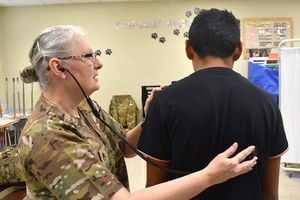Discover how innovative technologies are revolutionising elderly care, enhancing support systems and improving quality of life.
The global population aged 60 and above is surging, projected to double by 2050 and reach 2.1 billion. This demographic shift is increasing the demand for elderly care services and placing immense pressure on healthcare systems globally.
With the population aging, chronic conditions prevalence is on the rise, with around 80% of older adults suffering from at least one chronic illness requiring continuous care. This trend highlights the urgent need for cutting-edge solutions to bolster the health and well-being of older adults.
Innovations in Elderly Care Technology
AI and Machine Learning
Artificial intelligence (AI) and machine learning are changing the game by providing personalized medical services and aiding medication management, significantly reducing the necessity for frequent visits. For example, LUCID’s AI customizes music therapy to alleviate anxiety and agitation, adapting based on the user’s emotional state.
AI technologies are also capable of analyzing health data to identify conditions early, paving the way for custom care plans tailoring to individual needs. Such advancements promise to reshape personalized healthcare for the elderly.
Wearable Devices
Wearable tech is key for monitoring seniors’ health, tracking vitals, and identifying emergencies. These gadgets not only promote healthy lifestyle choices but also facilitate remote monitoring, allowing for early detection of potential health problems.
The worldwide market for wearable health technology is set to surpass $60 billion by 2023, illustrating substantial demand for these innovations. An apt example is smartwatches engineered to monitor heart rates and alert caregivers to any irregularities.
Telemedicine
Telemedicine is bridging the healthcare access gap for the elderly, providing remote healthcare services and minimizing the need for hospitalizations. This setup permits healthcare professionals to conduct consultations via digital platforms, heightening patient satisfaction and improving health outcomes, especially for those in rural settings.
For illustration, elderly residents of remote areas can benefit from specialist care through video consultations without the hassle of traveling. This ease of access is pivotal for seniors who may struggle with mobility.
The Role of Smart Home Technology
Enhancing Independent Living
Smart home technology is empowering older adults to maintain independence by integrating AI to detect falls and monitor health without the necessity for wearables. Voice-first technologies like Alexa simplify daily tasks, making interaction with technology less intimidating for seniors.
Smart home systems can manage lighting, temperature, and security, helping create a safer environment. For example, lights might automatically adjust when seniors enter the room, significantly reducing fall risks.
Addressing Challenges in Technology Adoption
Barriers to Implementation
Implementing new technology incurs multiple hurdles for caregivers, including high costs and accessibility disparities. Resistance to change, coupled with the pressing need for caregiver training, presents significant roadblocks to effective technology adoption.
Many older adults grapple with digital literacy, complicate their ability to embrace new technologies. A classic case could involve how challenging it is for them to set up new telemedicine apps without assistance.
Ethical and Privacy Concerns
AI use in elderly care raises ethical concerns primarily focused on privacy and the necessity of balancing tech efficiency with human warmth. Care systems must figure out how to incorporate technology effectively without compromising the emotional support seniors need.
It’s also imperative for regulatory frameworks to advance alongside technological growth, addressing data privacy concerns tied to older adults. Finding this balance is not just important; it’s fundamental.
Future Opportunities and Collaborative Research
Embracing AgeTech
The AgeTech sector aims to leverage technology to facilitate healthy aging and improve overall quality of life for older folks. Collaborative research will play a pivotal role in crafting inclusive AgeTech solutions addressing the diverse needs of the elderly.
Investment within the AgeTech ecosystem is expected to skyrocket, targeting $20 billion by 2025. Initiatives like the Aging in Place Challenge Program exemplify efforts to allow seniors to live independently at home.
Promoting Age-Friendly Environments
Communities can nurture age-friendly atmospheres by incorporating technology to make living spaces more accessible for older adults. Policymakers have to tackle digital literacy hurdles to enable seniors to utilize new technologies effectively.
Emerging care models, like shared housing or interdisciplinary care teams, offer holistic support to seniors. A community initiative might blend smart home tech with collective spaces for social engagement among residents, fostering connectivity.
The Impact of Technology on Elderly Care
Technological advancements are reshaping care for seniors, substantially heightening their quality of life. The integration of AI, wearables, and virtual reality could revolutionize elderly care, unlocking novel ways to monitor health and engage seniors meaningfully.
Harnessing these innovations can lead to reduced healthcare expenses and enhanced experiences for both seniors and their caregivers. There's great promise on the horizon for personalized, efficient, and compassionate elderly support systems.



